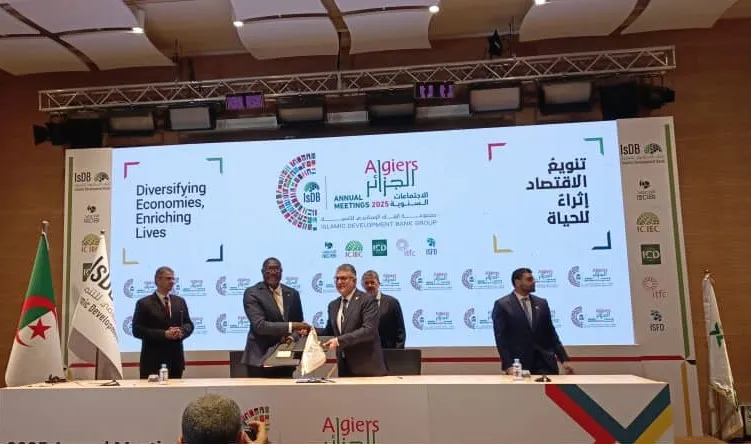In a significant move to strengthen trade flows and economic resilience in West Africa, the International Islamic Trade Finance Corporation (ITFC), a member of the Islamic Development Bank (IsDB) Group, has partnered with the ECOWAS Bank for Investment and Development (EBID) to launch a $100 million syndicated trade financing facility. The agreement, signed on 21 May 2025 during the 50th IsDB Group Annual General Meetings in Algiers, marks a pivotal step towards deepening economic integration across the ECOWAS region.
The facility aims to unlock financing for critical trade activities, empowering local businesses and governments across the ECOWAS Member States to access essential goods, capital, and services. By easing liquidity constraints and enabling competitive participation in global markets, the initiative is poised to bolster intra-African commerce while supporting broader sustainable development goals.
The agreement was formalised in a ceremony attended by senior officials from both institutions. ITFC was represented by its Chief Executive Officer, Eng. Adeeb Yousuf Al-Aama, while EBID was represented by Dr Andrews Amankwah, Director of Treasury and Resource Mobilisation, on behalf of the institution’s President and Chairman of the Board of Directors, Dr George Agyekum Donkor.
A strategic financing boost for ECOWAS
The newly signed facility reflects EBID’s strategic mandate to provide financial support that accelerates socio-economic transformation in West Africa. As the Development Finance Institution of the Economic Community of West African States (ECOWAS), EBID plays a crucial role in funding regional integration, trade facilitation, and sustainable development projects. This latest partnership with ITFC represents a further deepening of the Institution’s commitment to delivering tangible, large-scale results across the 15-member regional bloc.
The funds mobilised under the facility will be channelled into trade-related sectors with high economic impact, including energy, agriculture, manufacturing, and basic commodities. With trade being a key engine of growth in the ECOWAS region, improved access to finance is expected to drive production, generate employment, and raise living standards for millions across West Africa.
Dr Amankwah emphasised that the partnership underscores EBID’s enduring focus on ensuring financial inclusion and economic empowerment. “This agreement goes beyond numbers. It is about empowering businesses and communities by unlocking the resources they need to grow and thrive. It is about building a more prosperous, integrated and competitive West Africa,” he said.
Bridging the trade finance gap
Trade finance remains a persistent challenge across Africa, with an estimated annual gap of over $81 billion, according to the African Development Bank. Small and medium-sized enterprises (SMEs), which constitute the backbone of many African economies, often face acute difficulties in accessing affordable financing. These constraints inhibit their ability to scale, participate in cross-border trade, or integrate into regional and global value chains.
ITFC, established in 2008 with a mission to advance trade among Organisation of Islamic Cooperation (OIC) member countries, has consistently sought to address these challenges by providing tailored financial solutions. Its trade finance instruments help bridge liquidity shortfalls and reduce risk, enabling countries and enterprises to engage in essential imports and exports.
The Corporation’s strategic alliance with EBID builds on a series of successful collaborations across Africa, and aligns with its wider commitment to advancing inclusive and sustainable trade. Over the past decade, ITFC has approved more than $66 billion in cumulative financing, with West Africa receiving a significant share of its investments.
According to Eng. Al-Aama, the current agreement is emblematic of ITFC’s efforts to form impactful partnerships that deliver transformative results. “We are proud to work with EBID to support regional economic development and enhance the competitiveness of ECOWAS countries. This facility is a practical demonstration of our shared commitment to trade-led growth and financial cooperation,” he remarked.
Driving competitiveness through strategic partnerships
The timing of the agreement is particularly significant. As Africa moves to operationalise the African Continental Free Trade Area (AfCFTA), there is growing demand for regional financing mechanisms that support trade facilitation, infrastructure development, and industrialisation. The ITFC-EBID partnership responds directly to these needs, offering a scalable financing platform that can help ECOWAS countries align their trade policies with continental integration objectives.
Furthermore, the facility underscores the importance of multilateral cooperation in achieving shared development goals. By pooling resources, technical expertise, and risk-sharing frameworks, institutions like ITFC and EBID can unlock larger volumes of capital and deliver projects with far-reaching developmental impact.
Analysts note that such collaboration is essential for ensuring Africa’s recovery from recent global shocks, including the COVID-19 pandemic, climate volatility, and supply chain disruptions linked to geopolitical instability. With trade finance emerging as a crucial lever for resilience, this latest deal serves as a model for how regional and international development finance institutions can co-create solutions to complex challenges.
Promoting inclusive growth and prosperity
At the heart of the initiative lies a broader ambition: to ensure that trade becomes a driver of inclusive and sustainable development. For millions of people across the ECOWAS region, greater access to goods, markets, and economic opportunities can mean the difference between poverty and prosperity.
In this context, the $100 million facility is not just a financial agreement—it is a vehicle for social impact. By helping countries import essential goods such as food, energy, and pharmaceuticals, and by enabling SMEs to expand their operations, the partnership directly contributes to improving livelihoods, enhancing food security, and fostering entrepreneurship.
It also complements EBID’s long-term development priorities, which include supporting youth and women-led enterprises, investing in climate-resilient infrastructure, and advancing regional value chains. By integrating these priorities into trade finance, both institutions are ensuring that economic growth translates into real benefits for ordinary citizens.
Looking ahead: scaling impact through innovation
As the ITFC-EBID facility gets underway, both partners are looking ahead to future opportunities to scale their impact. There are already discussions around extending similar trade finance mechanisms to other parts of Africa, using innovative instruments such as Islamic finance and blended funding to attract wider participation from private investors.
Moreover, digitalisation is expected to play an increasingly important role in enhancing the efficiency, transparency, and reach of trade finance operations. Both ITFC and EBID have expressed interest in exploring fintech solutions that streamline credit assessments, reduce transaction costs, and enable faster disbursements—especially to underserved segments.
Ultimately, the success of this partnership will be measured by its ability to catalyse real economic change on the ground. For West Africa, where the demand for jobs, infrastructure, and capital continues to grow, the ITFC-EBID deal offers a timely and hopeful signal: that with the right partnerships, trade can be a powerful engine for shared prosperity.
Want to continue reading? Subscribe today.
You've read all your free articles for this month! Subscribe now to enjoy full access to our content.
Digital Monthly
£8.00 / month
Receive full unlimited access to our articles, opinions, podcasts and more.
Digital Yearly
£70.00 / year
Our best value offer - save £26 and gain access to all of our digital content for an entire year!

 Sign in with Google
Sign in with Google 



